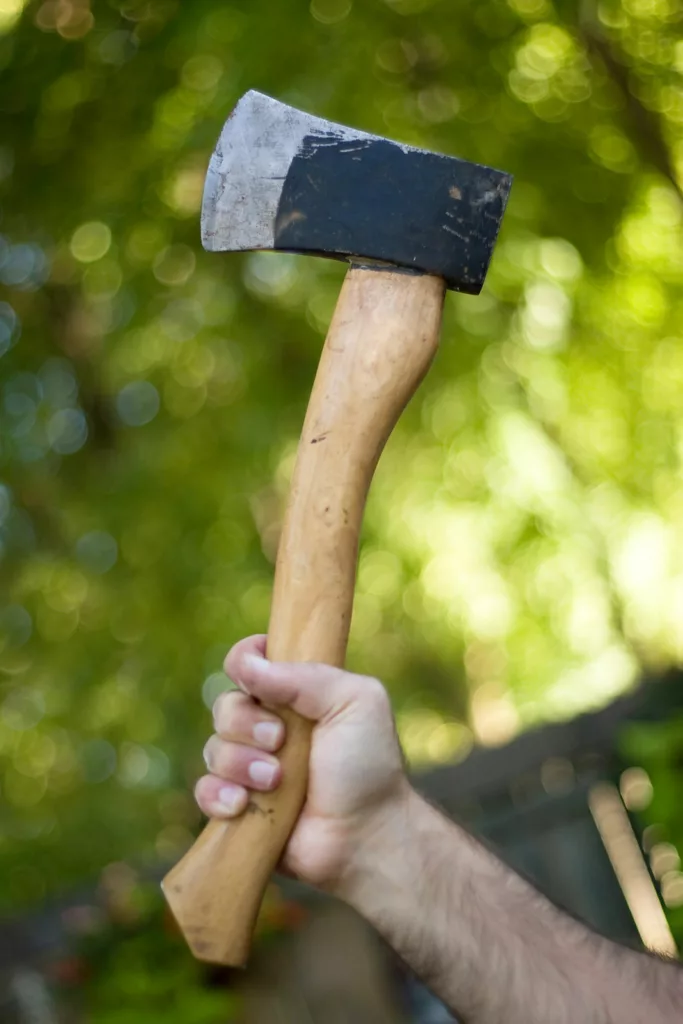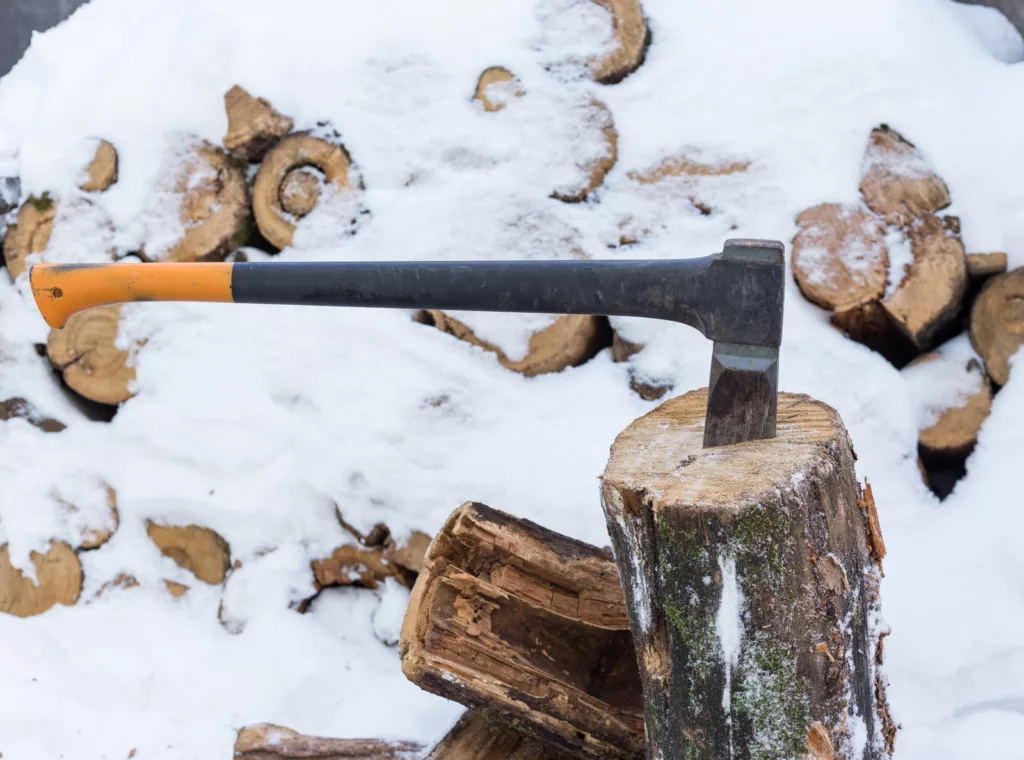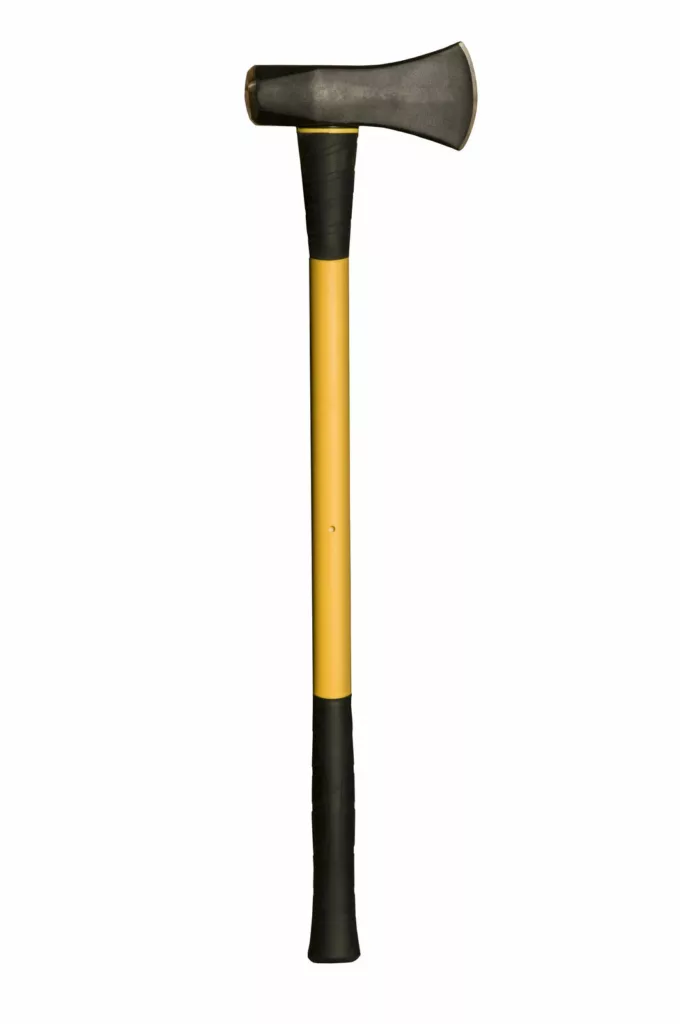Buying an ax is not necessarily as simple as walking into the local store and picking any that catches your eye. Remember, an extensive array of axes includes mauls, splitting axes, hatchets, and throwing axes. So how to choose an axe that best suits your task? Let’s explain that in detail below.
Different Types of Axes
You’ll come across different axes, each suited to a specific role. The primary three categories are as follows.
Small Axes – Tomahawks, Camping Axes, and Hatchets

Fig 1: A hatchet
Hatchets are primarily small axes, and you may find some people referring to them as camp axes.
Nonetheless, the defining difference between a hatchet and a typical ax is that while using the former, you only need to hold it in one hand. However, it would help if you held an ax with two hands for a good swing.
On average, a hatchet measures 18 inches in length and 1.5- 2 pounds in weight. It’s also a lightweight tool for splitting small logs/firewood, clearing a bush, and removing tree limbs. Besides, a hatchet is relatively cheaper than an ax.
Similar to the hatchet is a tomahawk, typically a Native American hatchet. It was fundamentally not for use in splitting wood. Rather, it was a war ax also valuable for hunting and self-defense. A typical tomahawk is 14 to 20 inches long and has no standard weight.
Medium-sized Axes- Boy’s Axes and Limbing Axes

Fig 2: An Ax
A limbing ax weighs about 2lbs and is essential in trimming limbs from trees. It is also around 2 feet long and has excellent chopping power. Often, we use a limbing ax when chopping branches off fallen trees, but they’re still ideal for splitting firewood and cutting down small trees.
Large axes – Mauls, Felling axes, and Splitting axes

Fig 3: A log-splitting maul
As their name suggests, large axes are the biggest type of axes you’ll come around. They measure between 32 and 36 inches in length. Besides, they are weightier than the average ax and may reach up to 7lbs. Thanks to their large size, they are excellent at splitting giant tree logs, felling large trees, and splitting huge firewood.
Felling Axes
In regards to specificity, felling axes are particularly essential in felling trees. They are large and thus relatively difficult to carry around. Also, we have splitting mauls that are larger than felling axes.
Mauls
Mauls also feature fatter cheeks than the average felling ax with a sledgehammer-like axehead. Thus, mauls deliver more torque when splitting wood than felling axes. Also, mauls don’t stick into the wood during splitting, as you’ll often experience while using felling axes.
Splitting Axes
Lastly, we have splitting axes that serve a similar role to mauls.
However, while mauls feature a dull edge and rely on their weight and broader head to split wood, splitting axes are sharper.
Choosing Axe Weight

Fig 4: A man holding an ax
Weight is fundamental when choosing the right ax for a specific job. As we have seen, the small to medium axes average weigh between 3 and 5 pounds. Such axes are suitable for smaller tasks such as felling small trees, limbing tree branches, and splitting small wood logs.
Furthermore, small axes are easy to carry, making them a good accompaniment for a camping expedition.
But, a large ax comes in handy for a tougher task involving giant felling trees or splitting large wood logs. Large axes also have more weight which is essential for their role. Also, if your looking for force over cutting edge when dealing with large tree logs, go for a maul over a splitting ax.
How to Choose an Axe: Choosing Axe Length

Fig 6: A young man holding an ax
Your ideal ax length primarily relies on your height; an ax must feel comfortable in your hands for a good swing and strike. However, there’s no standard length for an ax ideal for a particular person. Instead, any ax that you feel comfortable with during use is ideal.
Nonetheless, the following measurements are comparable with their respective user heights.
How to Choose an Axe: Material of Axe

Fig 7: Wooden Handles Ax is the most common
The axe handle material also matters. For most people, the wooden handle is the go-to kind of handle. However, in the contemporary era, there’s been more metal and reinforced plastic ax handles.
A reinforced handle is popular for its lightweight and sturdy properties over a wooden one. However, plastic wears down in an unnatural manner leaving an uncomfortable grip. Also, replacing a wooden handle is easier than a plastic one.
Lastly, metal handles are more durable than wood and reinforced plastic ones. But they’re also heavy and more challenging to replace. Nonetheless, you may also find metallic ultra-light camping axes with hollow handles.
Conclusion
You’re now equipped with the know-how to choose between different axes. For more, contact us at any time.
